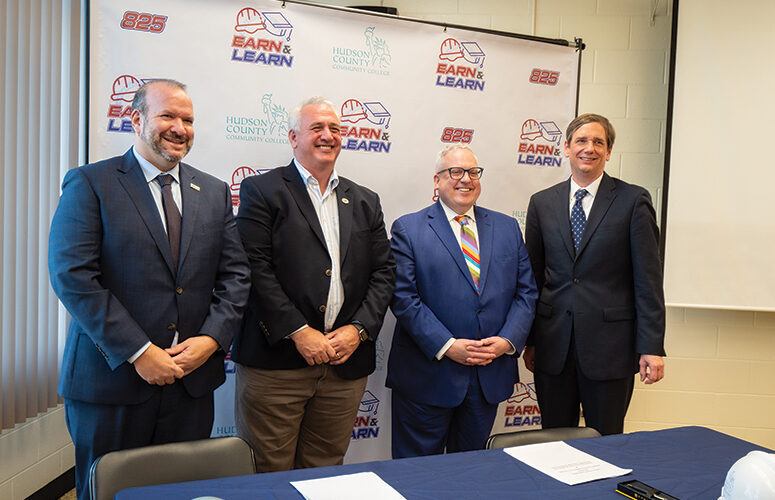
Reimagining the Road to Success
Transformational NJ Pathways program is preparing an innovative workforce.
By Vince Baglivo, Contributing Writer On May 10, 2022Aligning the state’s educational system with partners across the business spectrum is the goal of the NJ Pathways to Career Opportunities Program, launched jointly by the New Jersey Business & Industry Association (NJBIA) and New Jersey’s community colleges in December.
At the time of the announcement, New Jersey Council of County Colleges President Dr. Aaron Fichtner said it was “a new day for New Jersey’s economy.”
“With business and education working together in new and innovative ways, we will ensure New Jersey has the most skilled, innovative and well-educated workforce in the country,” Dr. Fichtner added.
NJ Pathways features 10 Centers of Workforce Innovation. Additionally, all of New Jersey’s 18 community college partners, as well as high schools, four-year colleges and universities, and community-based training providers across the state will be involved.
Since the program’s introduction, monthly collaborative meetings have featured industry and education partners focused on the program’s four key industries: Health Services, Technology & Innovation, Infrastructure & Energy, and Manufacturing & Supply Chain Management. More than 360 stakeholders attended a NJ Pathways virtual meeting in January as the initiative kicks into high gear in 2022.
In February, NJBIA’s Head of Government Affairs, Chrissy Buteas, joined Dr. Fichtner as part of a live panel discussion on NJ101.5 radio’s Town Hall titled “College Alternatives,” including career opportunities for workers in skilled trades through initiatives like NJ Pathways.
“With such a dynamic economy and job market, it is imperative for employers, academia and policymakers to be working collectively to meet the workforce demands of the future,” Buteas says. “Partnerships are key to the preparedness of the workforce. If employers are not at the table informing academia and policy makers on the needs of the future, a perpetual disconnect will take place. The result will be a workforce ill-equipped to meet the demands of the job market.
“It is important to note that the employer community is key to have around the table,” Buteas adds, “because they determine the credentials that are needed for a job; not academia deciding for business. “That is why partnerships and collaboration are key, and why we are encouraging all stakeholders to get involved in the NJ Pathways initiative.”
Over the past several years, IUOE Local 825 has forged partnerships with like-minded groups in management, government agencies, and most recently, education. In a new partnership with Hudson County Community College (HCCC), Local 825 apprentices will receive 30 college credits toward an associate’s degree upon completion of their apprenticeship. During this time, they will enroll in courses for 18 credits, leaving only 12 credits left to achieve their associate’s degree.
Greg Lalevee, Local 825’s business manager, says evolving technology plays a big part in the need for a program like this. Over its 100 year history, Local 825 operating engineers have transitioned through significant changes in construction equipment tech to preserve their mastery of heavy equipment operation.
“Technology today, like GPS-guided equipment, robotics and artificial intelligence, is significantly more complex than anything that came before it. Future operating engineers will need to master not only the heavy equipment itself, but also the technology that runs it,” Lalevee points out. “Apprenticeships through New Jersey community colleges will allow people to earn a living while getting the training needed to advance themselves in a meaningful career.”
Local 825 intends to expand relationships with other community colleges in the future. Partnering with institutions of higher education helps to raise the level of member education, especially in the early, more formative stages of a member’s career.
“Community colleges are great to partner with because they are rooted in the communities where we work, and our members live. They offer broader career and technical education,” Lalevee adds. “On our side, we offer community colleges access to millions of dollars in heavy construction equipment – bulldozers, cranes, pavers, simulators – at our state-of-the-art construction training facilities in New Jersey and New York, where veteran operators teach members themselves. Together with our like-minded partners, we have developed a winning formula that works for us, the colleges, the construction industry, and the New Jersey economy as a whole.”
“Partnerships, in general, provide a platform for creative dialogue. When stakeholders build relationships and establish respect for each other, the obstacles in front of us become easier to navigate,” Bernie Corrigan, president, IBEW Local 102, concludes. “It is essential that business, labor and the educational community come together to have a better understanding of the skill sets needed by end users and provide access to the education at an affordable cost. An educated workforce will attract business to New Jersey, resulting in more quality jobs. Opportunity for better employment, in turn, would help stem the loss of top candidates to other states.”
To access more business news, visit NJB News Now.
Related Articles:




